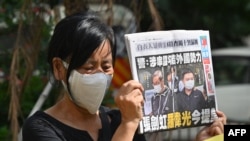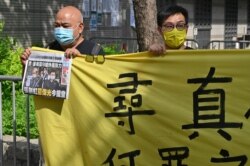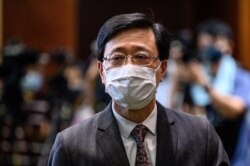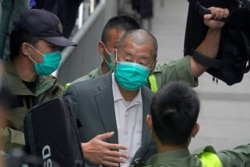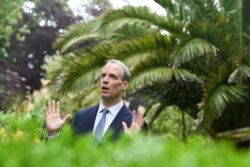Hong Kong’s last pro-democracy newspaper appeared one step nearer to closing Monday, as Apple Daily announced it was airing its last nightly news show and dozens of staff resigned.
The announcements came as Apple Daily’s board members met to discuss the paper’s viability after police last week raided its offices and arrested five executives, and authorities froze the parent company’s assets.
The Hong Kong government’s decision to freeze Next Digital’s assets, totaling a reported $HK18m ($2.3 million), has left the publisher unable to pay staff or vendors.
Two of the five executives arrested Thursday remain in custody. All are accused of foreign collusion under Hong Kong’s national security law.
Reuters cited an internal memo that says Apple Daily’s board is expected to make a decision later this week that could result in June 26 being the final print run.
A reporter at Apple Daily, who asked to be identified only as “Lee” because of security fears, told VOA that over 50 of the paper’s team resigned Monday evening.
“News team and finance team had mass resignations. All video editors have resigned,” Lee’s message read. According to the journalist, Apple Daily has around 600 staff, including editorial and administration.
“I’m feeling somber. I know sooner or later Apple Daily will be forced to shut down,” Lee said, adding that he hadn’t expected the end to come in just a few days. The journalist said he planned to work “until the last minute.”
The resignations came as an anchor for the media outlet’s daily 9:30 p.m. live news report announced that Monday’s broadcast would be their last.
Mark Simon, the representative of Next Digital’s major shareholder, told VOA the order to freeze financial assets came directly from the Hong Kong government’s security department.
“There is an order from the Secretary of Security (John Lee). He has said you can’t touch any money, move any money, take any money, transfer any money. Basically, no money, no news,” Simon said over the phone.
“We’ve never been to the court. All this action is a security services’ action. There is no rule of law in place in terms of actions,” he added.
A spokesperson for Hong Kong’s Security Bureau told VOA it will not comment on active legal proceedings and that the Secretary for Security handles applications related to frozen property “in accordance with the law.”
"Endangering national security is a very serious crime,” the spokesperson said. “We handle such crimes according to the law, targeting at illegal acts, and invoke the power to freeze offense-related properties based on need and the law.”
Simon, who left the city last year to avoid potential arrest, said Apple Daily sent a letter to Hong Kong’s security department requesting financial access. But, Simon said, the response they received was that it will be dealt with “in due time,” despite the publisher’s struggling to stay afloat.
Responding to rumors the company could close as soon as Wednesday, Simon said, “As far as I know there is going to be another (board) meeting on Thursday.”
But he acknowledged, Apple Daily is “losing people” and employees are “making individual decisions.”
“People are scared they (the police) are coming back. The staff are getting phone calls they are coming to arrest people,” he said.
Legal pressures
Hong Kong was promised autonomy under the “one country, two systems” agreement when the city was returned from British rule in 1997. Concern over Beijing encroaching on the territory’s freedoms resulted in civil unrest in recent years, including anti-government protests in 2019.
In June 2020, Hong Kong passed a national security law that bans acts that authorities deem as subversion, secession or foreign collusion.
In the past 12 months, authorities have used the broadly defined law to jail activists and critics.
U.S. State Department spokesperson Ned Price said Monday that America is deeply concerned by Hong Kong’s “selective use” of the law.
“We’ve seen it used in appalling ways, including to arbitrarily target independent media organizations,” Price said, adding that the charges are “purely politically motivated.”
Simon said that Hong Kong’s actions will have a lasting effect on the territory.
“There is no free society without a free press. But this is also an attack on property rights. They are stripping away a company from its shareholders, and they are depriving employees of a place of work that is an ongoing concern,” Simon said.
“The lasting impact of this will be a destruction of press freedom and a destruction of property rights, which will lead to a destruction of the market. You cannot have political prisoners, you cannot close down media, you cannot seize private property and be an international finance center; it doesn’t happen,” he added.
Founded as a tabloid paper in 1995 by media tycoon Jimmy Lai, Apple Daily later expanded to report on politics and became known as a stark critic of Beijing.
But with its open criticism of China, sponsors became cautious, leading to a decline in advertising revenue for the newspaper.
Last August, Lai was arrested under the security law for alleged foreign collusion, and dozens of police raided the Apple Daily offices. Lai is awaiting trial in that case while serving a sentence for separate convictions.
Hong Kong authorities froze Lai's local assets last month, and the publisher’s Taiwan branch announced it would end its print edition amid declining advertising revenue.
The 73-year-old Lai was named Monday as the Gwen Ifill 2021 press freedom awardee by the New York-based watchdog the Committee to Protect Journalists.
“Jimmy Lai is not just a champion of a free press, he is a press freedom warrior. He fights for the right of his Apple News organization to publish freely, even as China and its backers in Hong Kong use every tool to quash them,” CPJ board chair Kathleen Carroll said in a statement.
Western governments have condemned Hong Kong’s actions against Apple Daily, with Britain’s Foreign Secretary Dominic Raab saying the raid was directed at silencing dissent.
"Freedom of the press is one of the rights China promised to protect in the Joint Declaration and should be respected," Raab said, referring to the 1997 agreement.
EU spokesperson for foreign affairs Nabila Massrali said the Apple Daily case "further demonstrates how the national security law is being used to stifle media freedom and freedom of expression in Hong Kong."
EDITOR’S NOTE: Paragraphs 13 and 14 of this article have been updated to include a response from Hong Kong’s Security Bureau.




